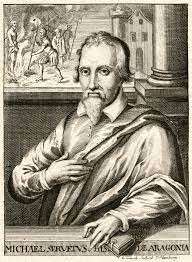
A Spanish physician and theologian who was unorthodox both in his medical (he taught that the stars influenced health, but it was also him who discovered pulmonary circulation of the blood from the right chamber of the heart to the lungs) and his theological views. It was, however, the latter which got him into trouble. There are indications that, disillusioned by the pomp and and luxury of the imperial court in which he once served, he had in fact been drawn towards the reformers, with many of whom he had contacts and corresponded. In 1531 he published his view on the Trinity, which was revised the following year, in which he vehemently denied the Trinity, asserting that the Church—both the Catholic and Protestant—had misunderstood it. Given the religious climate of the age, what Servetus did was not just to make himself odious to the reformers (Calvin, after some period of correspondence with him, promised not to have any more to do with him) and to sign his own death warrant. Hated by the Reformers, he also became an object of attention for the Catholic, who had arrested him in April 1553 and put him on trial, though he managed to escape.

Beyond any rational explanation Servetus turned up, just four monts later in Geneva, where he knew he would be recogized and would not be treated kindly. While Calvin was preaching in St Pierre Servetus entered the church and boldly took a seat in the congregation. He was immediately recognized, arrested, and soon put on trial for heresy. Though Calvin, who was deeply involved in the trial, pressed for an execution instead, Servetus was burned alive at Champel on 27 Oct 1553. Servetus's trial and death severely damaged Calvin's reputation and left a stain on Reformed theology ever afterwards. In October 1903, however, the citizens of Geneva—"Dutiful and grateful followers of Calvin our great Reformer, yet condemning an error which was that of his age, and strongly attached to liberty of conscience, according to the true principles of the Reformation and of the Gospel"—erected an "expiatory monument" to Servetus, acknowledging that his execution was an error.

"Expiatory Monument" to Servetus
Despite his death, Servetus's writings turned out influencial especially on the then developing Socinian movement in Poland and the Unitarian movement elsewhere.

Further Reading & Resources:
William Wileman, "Calvin and Servetus," Banner of Truth, 2009.
html N 5-6 (Open on Phone)

©ALBERITH
230421lch